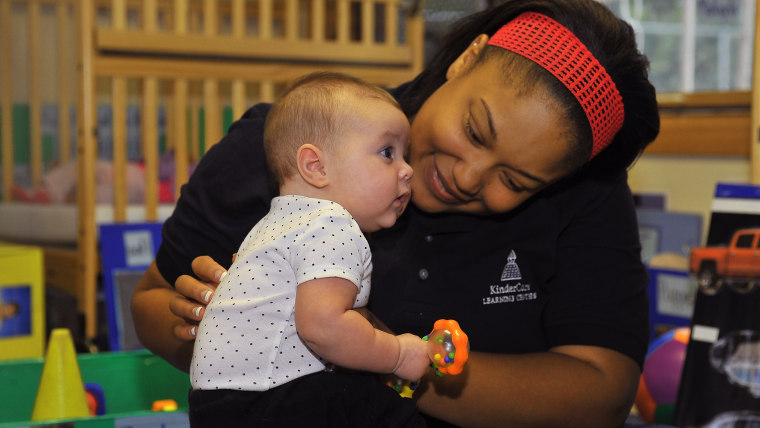It’s well established that baby talk plays a huge role in helping the wee widdle babies learn to tawk. And — no surprise — moms talk more to babies than dads do.
But it seems that the baby's sex plays a role, too: Moms may be talking more to their infant daughters than their sons during the early weeks and months of a child’s life.
In a new study published Monday in the online edition of Pediatrics, researchers looked at the language interactions between 33 late preterm and term infants and their parents by capturing 3,000 hours of recordings.
Somewhat surprisingly, the researchers found that moms interacted vocally more with infant daughters rather than sons both at birth and 44 weeks post-menstrual age (equivalent to 1 month old.) Male adults responded more frequently to infant boys than infant girls, but the difference did not reach statistical significance, say the researchers.
“We wanted to look more at gender and factors that affect these essentially mini-conversations that parents have with infants,” says lead author and neonatologist Dr. Betty Vohr, director of the Neonatal Follow-Up Program at Women & Infants Hospital of Rhode Island. “Infants are primed to vocalize and have reciprocal interactions.”
Indeed, when infants do vocalize (think of that little coo or heart-ripping yell), moms are immediate responders, while “dads are more relaxed,” says Vohr, professor of pediatrics at Brown University’s Alpert Medical School. In fact, the researchers found that when moms are with babies they immediately respond to a vocalization about 88 to 94 percent of the time, while dads respond 27 to 30 percent of the time.
In a study published earlier this year in Pediatrics, Vohr and her colleagues found that premature babies, who often experience language delays, benefit from being exposed to adult talk as early as possible.
The researchers found that infants from birth through age 7 months were exposed to significantly more speech from moms compared to dads, and that infants preferentially responded to mothers’ compared to fathers’ speech. They also found that infants hospitalized in the neonatal intensive care unit, or NICU, were exposed to less speech compared to infants who were able to stay in rooms with their moms. Exposure to speech did increase for NICU babies after they were discharged from the hospital.
Although the researchers aren’t sure why moms spoke slightly more to infant girls rather than boys, they think it may be due to the fact that girls do have earlier brain maturation, make more eye contact and are better at “joint attention,” a kind of shared focus of two individuals on an object.
A significant gap in language input from dads could have longer-term implications for children as they mature. Indeed, studies have shown that dads’ language input, basically their involvement in speaking to infants and young children, may also be a predictor of a child’s language skills as they mature.
“This is an interesting study in terms of gender differences, but we do know that moms talk more to their kids than dads because moms spend more time with infants and children,” says Dr. Lynne Vernon-Feagans, the William C. Friday Distinguished Professor of Early Childhood, Intervention and Literacy and professor of psychology at the University of North Carolina. “But what I think is a real message here is that both parents play a role in language development.”
Her research suggests that fathers — not moms — actually may have more influence on a child’s language development. In a study of 1,200 infants in two-parent households, she and colleague Nadya Pancsofar at the College of New Jersey found that a dad’s education and vocabulary usage when reading to kids at 6 months of age were directly related to how expressive a child was at 15 months. And dads wound up influencing how advanced a child’s language skills were at 3.
The bigger question is should we be worried about boys getting what seems to be the shorter end of the conversational stick in early infancy?
“My take is ‘no,’ there’s no reason to worry since it seems to even out as a child gets older,” says childhood development expert Dr. Julie Braungart-Rieker, University of Notre Dame professor of psychology and director of the William J. Shaw Center for Children & Families.
“If a child seems understimulated, engage with them more, and if a child is overstimulated back off a little bit,” she says. But it’s very important for both moms and dads to engage with their kids. “I would like to give these researchers credit for including dads in the research,” she says. “Too often fathers are forgotten.”
In fact, the researchers would eventually like to create an intervention program that would teach dads about their role in language development, Vohr says. “Dads often feel left out of the loop, and we need to bring dads into circle of care.”
